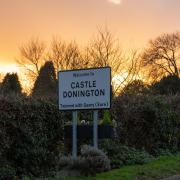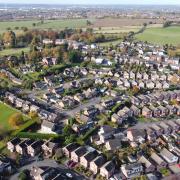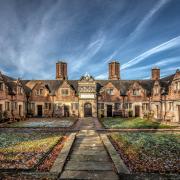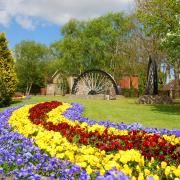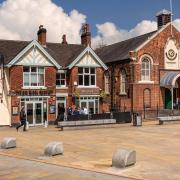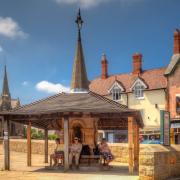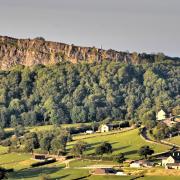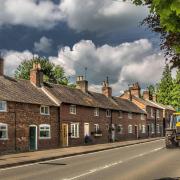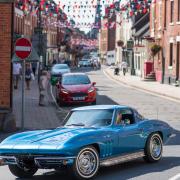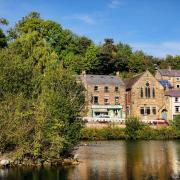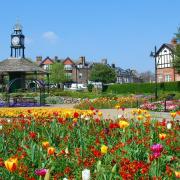Ashley Franklin visits three Derbyshire villages with a thriving golf scene

It’s remarkable that only two and a half miles north east of Derby city - and only a few hundred yards from the commuter buzz of the A38 - sits a village of quiet, traditional rural charm: Breadsall. As resident June Antill points out: ‘You can still walk for miles across meadows and fields.’ Walk further north through those meadows and fields, and you eventually reach Morley which, in a sense, is even more traditional than Breadsall in that it’s a scattered village made up of four settlements linked not by roads but by footpaths and bridleways.

Take the footpaths further north across more of this open countryside and, in contrast to Morley, you’ll behold the neat, compact village of Horsley. Like Breadsall and Morley it dates back to Domesday, though all three probably date back even further given the presence hereabouts of Roman roads - the Portway and Rykneld Street. The more modern link between Breadsall, Morley and Horsley is, ironically, something that can also be traced back to Roman times: their ancient game of paganica - the hitting of a stuffed leather ball with a bent stick - now evolved into golf.
There are over 2,750 golf courses in Britain. Five of them are enclosed within the two and a half-mile radius occupied by these three villages which must make it the most concentrated area of golfing activity after St Andrews.
Despite their closeness, each is subtly different: although Horsley Lodge and Breadsall Priory are members’ clubs, Horsley’s is more independent, Breadsall’s is more corporate; while Morley Hayes is not a members’ club at all, preferring to host ‘pay and play.’
All three clubs are thriving following the best summer in seven years, especially good news considering they are a boon to the local economy, together employing around 500 staff and attracting countless visitors into our county.
There is a further benefit, according to Horsley Lodge co-director Richard Salt: ‘Having three quality venues close to each other gives us extra impetus in striving to keep at the top of our game. This benefits not only local golfers but also residents whose house prices can reflect being in an area of such golfing pedigree.’
BREADSALL PRIORY
Now in its 21st year as part of the Marriott family, the Breadsall Priory Hotel & Country Club boasts on its website ‘760 years of hospitality.’
Augustinian Canons established a small priory in the 13th century in ‘a fruitful sheltered nook... surrounded by gardens and orchards,’ a possible reference to Breadsall’s preponderance of damsons, later used for making dyes at Derby’s Silk Mill.
Following the Dissolution of the Monasteries of 1538, the ruined Priory was converted to a dwelling house. Its most famous incumbent has been Charles Darwin’s grandfather, Dr Erasmus Darwin, physician, poet, botanist and naturalist. Another notable owner was Sir Alfred Haslam, a pioneer of refrigeration in late Victorian times, though it was his son Eric, the last private owner, who came to ‘lavish much love and care on the estate’. This involved planting many of the fine trees that now distinguish the Priory golf course.
The conversion to a golf club was a life-saver for the Priory. In 1971 visiting property developer and hotel owner David Cox would have seen a forlorn empty house with overgrown grounds and rutted drive. However, he declared that he had beheld ‘a superb old building’ and the potential of its 400 acres of land as a golf course. By 1977, Breadsall Priory was formally opened as a golf and country club. Further developments, refurbishments and improvements have produced two golf courses, golf shop, floodlit driving range, a leisure club with spa facilities, two restaurants and a bar, and a 112 bedroom hotel which hosts over 100 weddings a year.
‘There are 3,700 Marriott hotels in the world and this is special as it’s the oldest,’ reveals Sales Manager Nicola Hands. ‘I don’t think there is another hotel complex that comes close to the facilities we offer when you couple it with our historic and beautiful surroundings.’
As Director of Golf Ryan Charlesworth told me, being a Marriott means that all members gain free use of the eight other Marriott golf and leisure facilities in the UK as well as those in Europe. Of their 600 members, 56 are juniors, with a Breadsall team coming third in the recent English Junior Champion Club Tournament, and coach Paul Smith winning a PGA award for his commitment to junior golf.
They also have the choice of two different golf courses: the original Priory, a woodland-style course of undulating, tree-lined fairways and small greens; and the Moorland, a more open links course which, Ryan reveals, is ‘so well drained that only snow shuts it down.’ As a club, Ryan says that the Priory has a ‘strong social element... quite a few members have been here 20 to 30 years and a few of the staff have been here as long, so there’s a great sense of belonging.’
The ‘warm, friendly and welcoming attitude’ of the staff was a key factor in earning the Priory the Golf Yearbook’s East Midlands Golf Club of the Year Award 2013, with commendation for a ‘stunning course’ with ‘top greens and fairways cut to perfection.’ It was praised as a course ‘with a lot of character’ and ‘fantastic views over the Derbyshire hills.’
BREADSALL VILLAGE
One of the most conspicuous sights for Priory golfers is the lofty needle-point spire of All Saints in Breadsall. ‘Possibly the finest spire in Derbyshire,’ declared John Betjeman. With this striking church, thriving primary school, active community, attractive properties and easy access to main roads, Breadsall remains - in estate agent parlance - a ‘highly desirable’ village, The same could virtually be said of both Horsley and Morley, though there is one significant difference: Breadsall has never had a pub, simply because the Harpur-Crewes, in their long tenure of the estate, didn’t want one.
However, Breadsall still has what many villages have sadly lost: a store. Since taking it over two years ago, Nigel and Caroline Meakin have refitted the shop and, typical of village stores, sell ‘a bit of everything’ including even fresh meat.
The shop enjoys plenty of passing traffic, though even Nigel and Caroline would agree it’s excessive, with Breadsall’s main through road having long been a notorious rat run. However, some rats are now being held up by a large bird. Two and a half years ago, Breadsall was invaded by a peacock who has since hit the national headlines and, now virtually a resident, has even been named ‘Kevin’ by the villagers. As well as causing sleepless nights with his courting screech, measuring 115-decibels (equivalent to a jet fighter taking off), Kevin caused the village hall cleaner to take sanctuary in the lavatory when he came careering across the car park towards her, and regularly paralyses the traffic by taking naps in the main road. In spite of their efforts, the villagers have yet to find Kevin’s owners.
A more welcome visitor two years ago was Breadsall’s incoming rector, Rev Alison Maddocks. ‘I’ve come to a stunning and beautiful church,’ says Alison. ‘There’s a warmth about it, too, helped by the light pouring through our clear windows (the stained glass was lost in a blaze in 1914). The people are warm, too; this is a very homely village.’
HORSLEY LODGE
There would have been no swinging of clubs at Horsley Lodge had it not been for the kicking of a chair. The Lodge was built in 1863 by the Earl of Stainsby as a wedding present for his son who ungratefully never took up residence. In 1986, after over a century of being rented out, the property came up for auction. Derbyshire farmer John Salt attended. After reaching his maximum bid, a friend of John’s kicked his chair from behind. John took this as a sign to bid one further time and the auctioneer duly banged his gavel. As John turned around, his friend revealed that he hadn’t meant to kick John into his purchase. ‘I was merely uncrossing my leg,’ he was informed.
After farming the property for a couple of years, another friend intervened in Horsley Lodge’s fate. This time it was with a quiet nudge in the ear. ‘This would make a good golf course,’ advised a visiting golf pro. Fired with enthusiasm but daunted by cost, John’s sons Malcolm and Richard bought a digger, tractor and trailer and started on the project themselves. The course opened in 1990 with a further boost for its 600-plus members a decade later when former world champion golfer Peter McEvoy remodelled it, with water features on 12 of the holes cannily exploiting the two natural streams that traverse the estate.
‘Our course then become world class,’ recounts Richard, ‘and it improves with each passing year as trees mature and cutting methods improve.’ The course is now ranked number one in Derbyshire - on the golf booking website Golfshake - as voted by visitors to the course. This probably explains why the club has a full membership with a waiting list.
Never mind just Derbyshire, Peter McEvoy visited the Lodge recently and declared it to be ‘the best course I’ve seen in England this year.’
‘Golfers love the speed and trueness of our greens,’ says Kevin Lock, Head Golf Pro at the club. ‘It’s also a great course in being a testing challenge from the white tees but a fair, more forgiving experience from the yellow tees.’
Set scenically by the country lane that links Horsley and Morley, Horsley Lodge is also a fine setting for dining, with its Highlander Restaurant - nominated in the last two Derbyshire Food & Drink Awards - serving ‘stylish and simple’ dishes, all sourced locally. It’s also a small hotel with 11 individual bedrooms, ‘furnished to complement the history of the old Lodge,’ Richard Salt points out. The accommodation has helped boost weddings, with over 100 booked this year.‘Golf remains important, though,’ states Richard. ‘It’s our bread and butter. Weddings are the icing on the cake!’
HORSLEY
Richard Salt not only lives in Horsley but also serves as a parish councillor. His contentment with the village is shared by parish council chairman Margaret Beasley. ‘27 years ago, my husband and I came looking for a quiet but accessible place in the country,’ says Margaret. ‘Happily it’s remained quietly tucked away and relatively rural, with lots of lovely walks around. Lovely people, too.’
Margaret pointed me to Horsley’s ‘outstanding’ primary school, a charming village green, a pub that survived the downturn - the Coach & Horses - and the well-patronised and handsome church - St Clement and St James - with its broach spire and battlements.
There are a few quaint antiquities in Horsley, including a gritstone pillar box that, curiously, was only used between 1869 and 1887. It’s unique to Derbyshire and, possibly, the world. Opposite the box is one of three fountains given to the village by a Sitwell in 1864, bearing the names Blanche, Rosamund and Sophie, thought to be the names of the donor’s daughters.
Even more fascinating is the fact that tucked away on a wooded hillside are the remains of a castle built in the 12th century and rebuilt by King John, though why there was a stronghold facing the great castle at Duffield remains a mystery. Sadly, only one keep wall and a fragment of another wall remains. There may have been more to see had Lord Scarsdale not plundered it to help build Kedleston Hall.
MORLEY HAYES
The origins of Morley Hayes date back even further than Breadsall’s Priory as it was the original estate farm to the adjacent Morley Manor, first mentioned in 1002. Writing about Morley in Derbyshire Life in 1980, Roy Christian noted the village’s long adherence to farming - ‘with a cattle population very much greater than its human one.’ That may not be the case now, though Morley will always have an agrarian connection through the Derbyshire College of Agriculture at Broomfield Hall on the village’s outskirts.
The Allsop family bought the Hayes farm in the early 1980s and it was a change in agricultural practices in the late ‘80s - the EEC’s ‘Set-aside’ scheme - that brought the Allsops to plough a different furrow. ‘We were encouraged to diversify,’ explains managing director Andrew Allsop, ‘and we saw a gap in the market.’
Coincidentally, like Horsley Lodge, Morley Hayes’ growth is down to the vision of two brothers, namely Andrew and Robert. An even more remarkable coincidence is that not one of the four actually plays golf!
Initially, the Allsop brothers converted a redundant outbuilding to a ‘party barn,’ which acted as a driver for Morley Hayes’ reputable restaurant development. At the same time, they saw the rich potential for golf in the parkland setting with its mature trees and undulating ground. Today, there are two golf courses: a 9-hole Tower Course - ‘for golfers new to the game and short on time,’ Golf Manager Daniel Delaney points out; and the 18-hole Manor Course - ‘a Championship Course which offers an enjoyable, tougher challenge. The course is maturing all the time, too.’ Daniel and his team also run Morley Hayes’ own East Midlands Golf Academy which strives to increase the number of juniors, ladies and seniors into golf.
Morley Hayes favours the ‘pay and play’ system. ‘It enables us to offer golf to the public seven days a week without the typical golf club time restrictions,’ argues Daniel. Facilities also include a driving range which gets through around 1,250 baskets of balls per week (with 60 balls in a basket, that equals 3.5 million balls a year). As for the actual courses, the Tower gets 25,000 rounds a year while the Manor achieves 30,000.
The statistics for Morley Hayes’ other provisions are also impressive. There are around 150 weddings a year which allows the hotel to maximise its 32 bedrooms. The fine dining in the AA 2-star Dovecote earned it the Derbyshire Food & Drink Restaurant of the Year Award in 2012, while the more informal Roosters restaurant frequently gets through 300 covers a night at peak times.
So what’s the key to Morley Hayes’ success? ‘High quality product coupled with competitive pricing,’ states Andrew, ‘and we are always trying to better ourselves.’
MORLEY
Although the Allsops’ decision to diversify has been a pronounced success, farming continues with Robert’s Friesians supplying food for the restaurants. Both brothers are also very involved with the local community, not only by providing employment but also through sponsorship and charitable donations. One very satisfying project was the regeneration of Morley Hayes Wood, now managed by Derbyshire Wildlife Trust.
Unlike Breadsall and Horsley, Morley is spread out over a wide area, which is perhaps one reason why its two pubs have remained open, the Coach & Horses and the Rose & Crown being at either end of the Derby-Heanor road.
Another factor to link all three villages, other than golf, is the splendour of their churches. St Matthew’s in Morley has a similar impressive needle-point spire to Breadsall’s, as well as one of the finest displays of late medieval stained glass in the country - much of which came from the monastery at Dale Abbey. It also has the grand Gothic Sacheverell-Bateman mausoleum in the churchyard, built in 1897 to house the remains of the lord of the manor and beautifully restored in 2005. Other notable relics are the Almshouses on Morley Moor, built in the 17th century to accommodate ‘six poor, lame or impotent men’ and, on nearby Morley Moor is The Mound, the remains of a lookout post thought to date back to Roman times. Of course, these days one only has to look out for flying golf balls!






